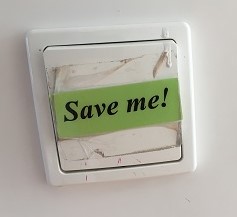I would say "save me" is fine in English. It ends up as somewhat of a pun, which doesn't translate well and might have been unintentional, but I don't think that detracts from the message.
It's common in English to talk about "saving electricity" or saving some other resource like money. This is listed as definition 4 of Save on dictionary.com:
to avoid the spending, consumption, or waste of
This works fairly well, and is extremely common in English. The only point for potential confusion is that the label is on a switch, so it could come across more as "save the light switch" rather than "save electricity". This is also where the double-meaning comes in; this interpretation invokes definition 1 or 2 instead:
- to rescue from danger or possible harm, injury, or loss
- to keep safe, intact, or unhurt; safeguard; preserve
In this context, the object is being personified and asking for help in some way. "Save me!" without any indication as to what they might need saving from is perfectly acceptable in English, though it does imply that there is some kind of danger that exists.
For a fluent English speaker, I think "Save me!" is fine and the dual interpretations are likely to be clear enough to understand, while the slight pun and personification will make the message more memorable and eye-catching. However, since the message is intended for a "bilingual school" it's possible that the double-meaning will be more confusing than it is worth. An alternative would be the more unambiguous "Save electricity!" which dodges the second meaning arising from "me". A shorter version could be "Save power"; it seems awkward to me, but it's comprehensible enough.


